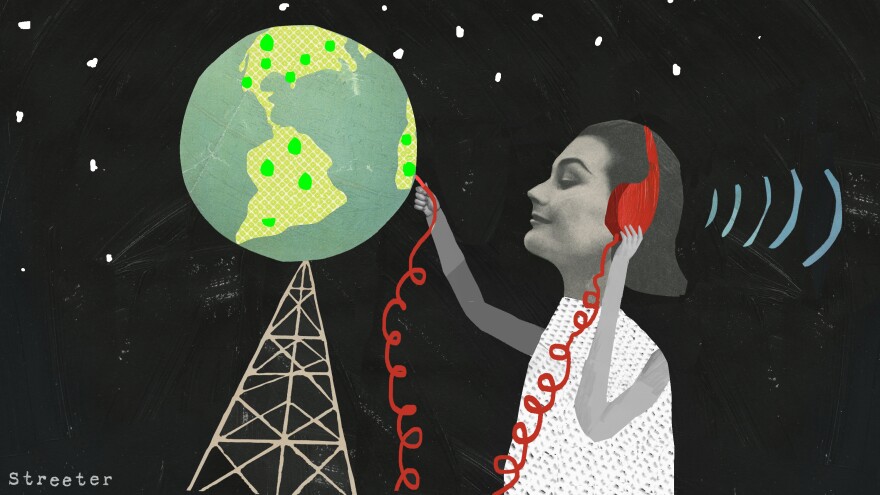Before my family bought a television set, it was radio that I stayed glued to. I must have been 10 years old, or maybe 9. My grandfather, uncle and I would sit close to a massive analogue radio. One of them delicately held the dial between the thumb and the index finger, fine-tuning, ear close to the speaker, listening carefully for a clear sentence of English amid the sizzle and the crackle of radio signals. A clear signal that lasted for barely a minute put a huge smile on our faces.
Back in the late 1970s, the rectangular machine was our window into the world, a world we had never been to.

Sometimes I listened to a cricket commentary for a game played in New Zealand, Or the news from BBC London. Every once in a while the radio caught a station that wasn't English, but I listened anyway. A foreign language from thousands of miles away — how exotic!
This week I stumbled upon a new website on the Internet called . Curious, I clicked on it and a globe started spinning before my eyes. It looked similar to Google Earth. Then I zoomed into the northeast part of the United States. And then a radio station started playing. On the bottom left side of the screen it said, Lewiston, United States. This is about 30 miles from Brunswick, Maine, where I now live. On the bottom right side, it said WRBC. The Bates College radio station was playing.
I planned to move the cursor halfway around the world to my homeland but first I dropped in on Tehran, Iran. My screen now said Radio Hamdam. I couldn't understand a word of the song, but the rhythm was upbeat, the kind of music you'd listen to while running on a treadmill. After two songs, I then wandered to Ghana. Highlife Radio Ghana, Kokrokoo FM 90.5 was on my screen. This seemed to be a talk show. Two guys were talking in a language unknown to me, but one of them was speaking in an animated voice, the other was laughing hysterically. They reminded me of Tom and Ray Magliozzi from Car Talk.
To find out more about Radio Garden, I contacted Jonathan Puckey, who is based in Netherlands and is one of the people behind this project.
"The main idea is to help radio makers and listeners connect with distant cultures and re-connect with people from home and thousands of miles away," he told me. So far, some 8,000 stations have signed on.
The website just launched this Monday, and it's got a few glitches. Not every station is located in the right place on the map. For example, if you point at a dot in Texas to listen to a Lone Star broadcast, you might get a station from Russia.
Puckey said he's already being inundated by calls from around the world: "Just yesterday, 300 stations requested to be added. It's going viral. We were not expecting it to be this big. There are 56,000 page views per minute. We have a meeting tomorrow to see how we are going to manage this."
He also told me that Radio Garden is funded with public money from the Netherlands Institute of Sound and Vision and that there is no commercial aspect to the project right now.
I thanked him, ended the call and moved the cursor to Lahore, Pakistan. I had never listened to a Pakistani radio station, although it's a country next door to my native India. I was hoping to find an Urdu language station — I can understand Urdu. Only "Somebody to Love" by Jordan Smith was playing. I wondered if this was one of the geographic glitches that Puckey was talking about. I stayed on the station for a few more minutes and heard a Pakistani host with a fake American accent. He threw in a sentence in Urdu later. It wasn't a mistake. It was a station in Lahore, Pakistan, that played songs by American singers. The next song was "Can't Feel My Face" by The Weeknd.
I took the cursor to India and put it in New Delhi, India. A Hindi devotional song was playing. The bottom left of the screen said, 10.57 p.m., New Delhi. On the right: Bollywood Radio. I couldn't help but smile.
The whole experience of tuning into stations on Radio Garden was exactly like the analog radio I used to tune several decades ago. Even the crackle and interference of other stations sounded the same. The only difference was that I was using the track pad of my laptop — not the radio dial.
I thought about how Jonathan Puckey described Radio Garden's idea of connecting listeners with distant cultures and re-connecting people with their roots. I found it funny and true. Back in India, when I was little, I used radio to connect with faraway places. Now living in the U.S., I was using Radio Garden to go home again.
Deepak Singh is the author of How May I Help You?: An Immigrant's Journey From MBA to Mininum Wage.
Copyright 2021 NPR. To see more, visit https://www.npr.org. 9(MDEwMTk5OTQ0MDEzNDkxMDYyMDQ2MjdiMw004))












